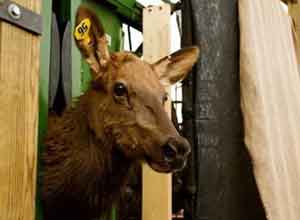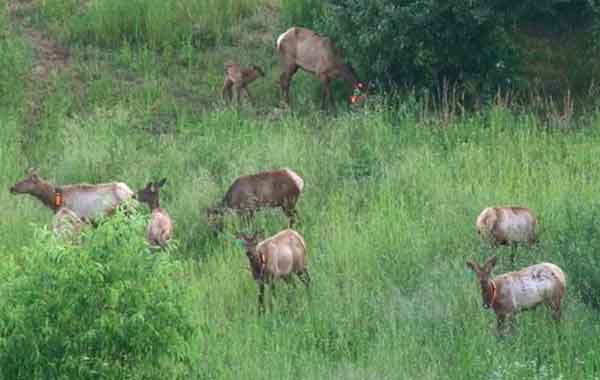 May 2012 – March 2014
May 2012 – March 2014
Translocated elk disease testing
Rigorous health testing was performed on all elk translocated to Virginia. This was done in order to minimize the chance of translocating a diseased or debilitated individual.
The health testing protocol was a dynamic document that was closely reviewed and adjusted each year. Diseases of interest and approved diagnostic tests changed slightly each year. It was developed with input from the Virginia Department of Wildlife Resources, the Virginia Department of Agriculture and Consumer Services, and the United States Department of Agriculture – Veterinary Services.
Course of action for positive, seropositive, or suspect results
A course of action for any positive, seropositive (i.e., antibody-positive) or suspect result was pre-determined for each disease prior to the collection of samples.
Bovine tuberculosis and brucellosis: Suspects were to be euthanized, necropsied, and tissues submitted for culture. No movement of any elk out of the quarantine pen in Kentucky was authorized until negative culture results were returned.
Chronic wasting disease: Test-positive elk were to be euthanized and the diagnosis confirmed. No movement of any elk out of the quarantine pen in Kentucky was authorized if the diagnosis was confirmed.
Johne’s disease, bovine viral diarrhea virus, anaplasmosis: Infected elk were prohibited from entering Virginia.
Bluetongue, epizootic hemorrhagic disease, vesicular stomatitis: Follow-up testing was required for any seropositive (i.e., antibody-positive) individuals. Individuals determined to be positive via viral isolation or polymerase chain reaction were prohibited from entering Virginia.
Infectious bovine rhinotracheitis, leptospirosis: Seropositive (i.e., antibody-positive) individuals were authorized to enter Virginia.
Disease Testing Results
* indicates that virus isolation or polymerase chain reaction testing was performed in all antibody-positive elk and determined that the individuals were not actively infected with the disease.
No actively infected individuals were permitted to enter Virginia.
2012
Diseases tested for: Bovine tuberculosis, brucellosis, blue tongue, epizootic hemorrhagic disease, Johne’s disease, vesicular stomatitis, anaplasmosis, infectious bovine tracheitis, leptospirosis, bovine viral diarrhea virus, chronic wasting disease.
Quarantine length: 90 days.
Results:
- February: Three Leptospira pulmona antibody-positive elk; two bluetongue antibody- positive elk*
- May: Ten bluetongue antibody-positive elk* (four elk translocated to Virginia). Five epizootic hemorrhagic disease antibody-positive elk* (two elk translocated to Virginia).
2013
Disease testing list: Bovine tuberculosis, brucellosis, blue tongue, epizootic hemorrhagic disease, Johne’s disease, vesicular stomatitis, anaplasmosis, bovine viral diarrhea virus, chronic wasting disease.
Quarantine length: 90 days.
Results:
- February: One vesicular stomatitis antibody-positive elk*; three epizootic hemorrhagic disease antibody-positive elk*
- May: Thirty-four bluetongue antibody-positive elk* (five elk translocated to Virginia). Five epizootic hemorrhagic disease antibody-positive elk* (one elk translocated to Virginia).
2014
Disease testing list: Bovine tuberculosis, brucellosis, blue tongue, epizootic hemorrhagic disease, Johne’s disease, vesicular stomatitis, anaplasmosis, bovine viral diarrhea virus.
Quarantine length: 45 days (necessary quarantine time reduced on account of expanded testing methods as allowed by the USDA).
Results:
- February: One bluetongue antibody-positive elk*; three epizootic hemorrhagic disease antibody-positive elk*
- March: Four bluetongue antibody-positive elk* (four elk translocated to Virginia); five epizootic hemorrhagic disease antibody-positive elk* (five elk translocated to Virginia)
Disease Testing in the Future
All elk mortalities in Virginia are investigated for disease sampling purposes, including hunter-killed elk carcasses. If you find a dead elk please call 804-367-0044 and leave your full name, phone number, location of the elk, and the date.


